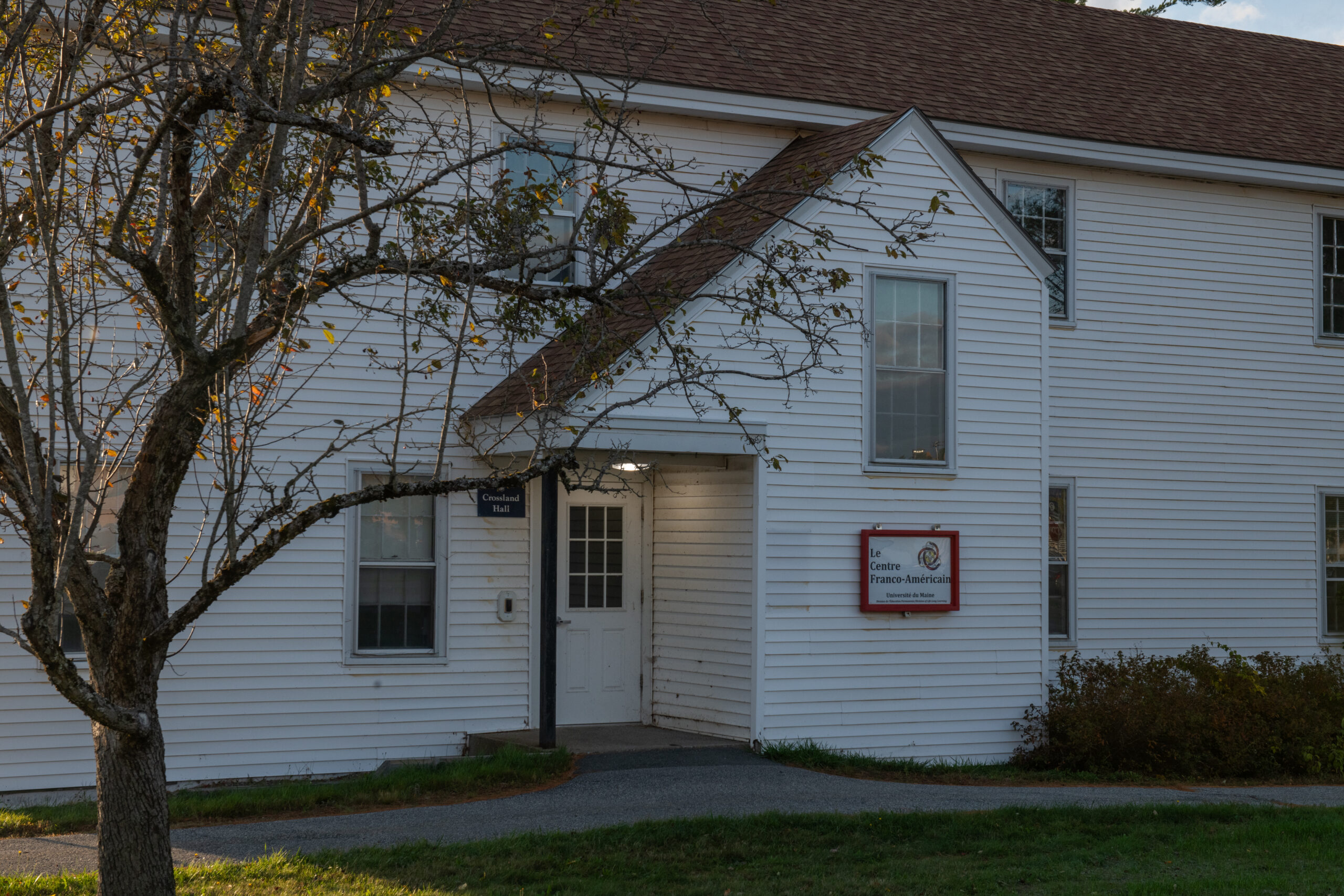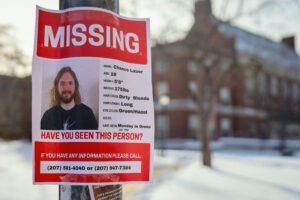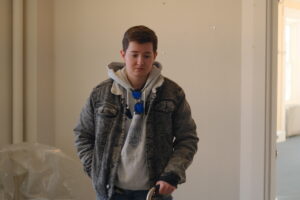Student advocacy brought Franco-American programs to the University of Maine back in the ‘70s. Now, students are advocating to save Crossland Hall –– home to the Franco-American Centre –– from demolition.
“It’s like a second home on campus,” said Alex Emery, president of the Franco-American Resource Opportunity Program (FAROG).
While Emery feels sentimental toward the community within the building, it is also “home” in a physical sense. Crossland Hall once housed UMaine’s second president, Merritt Caldwell Fernald. This farm house, built back in 1833, existed on campus for decades prior to the university’s founding.
Crossland Hall remains the oldest building on campus, and it is due for removal in the coming months to add a new parking lot by the sports complexes.
“For the University of Maine to do such a rash thing, we think is disrespectful to all of the staff, the people who put in blood, sweat and tears to build this institution and it being destroyed for parking,” said Emery. “That’s a terrible precedent.”
Crossland, which sits beside the Alfond Arena, is being replaced by a parking lot. Over winter break, the Franco-American Centre is to move across campus to Libby Hall. However, this migration will not be permanent, with a second move to the Environmental Science Laboratory (ESL) after 18 months.
A total of $50,000 is set aside to renovate Libby Hall and $500,000 is set aside to renovate ESL in preparation for the 2027 move. According to Franco-American Centre Director Susan Pinette, a dry kitchen will be built in Libby Hall for cooking events. She added that the staff was told they have a say in the renovation process at ESL.
An email sent to students by Interim Dean of Students Andrea Gifford on Oct. 6 mentioned that Crossland Hall is $10 million behind in maintenance, meaning that the most cost-effective option would be to move all Franco-American programs elsewhere.
“Rather than improve that outdated facility, UMaine will provide the programs with a more modern space at significantly less cost by relocating them,” said Gifford in the message.
One of the benefits listed for this change was enhanced program space, noting that the new “central” location for the organization can support “teaching, archives, events and partnerships.” Those not in favor of the decision question if ESL has the capacity to host the Centre, whose services are rooted in a welcoming home environment, as opposed to an academic setting with classrooms.
At first glance, the current Centre’s interior looks like a museum of Franco-American culture tucked inside a house. Community events like ‘Rassemblement,’ or gathering are offered in Crossland Hall, along with archival resources, art collections, food and genealogical technology to track heritage.
The Centre has historically hosted French classes for children, taught by education students at UMaine. In the wake of the upcoming move, these classes are not currently offered.
Many events involve making crafts to donate, such as blankets for the homeless shelter, wreaths for the Maine Veterans’ Home, Christmas candy pouches and Christmas trees for the local nursing home and donations for the Orono Food Cupboard. They also facilitate the annual FAROG Toy and Food Drive for the Old Town Middle School.
Fernald went on to publish a book on UMaine’s earliest history, titled “History of the Maine State College and the University of Maine.” In it, he explains the context in which Crossland Hall was granted to the university.

Crossland Hall, having been present in the midst of UMaine’s initial construction in the 1860s, was on land belonging to Orono and Old Town. UMaine was granted a deed to the land in 1865. In this agreement, Fernald noted there was a clause that the land must be used for educational purposes, based on the moral Land Grant Act the university was built on. In the event that it is no longer doing so, the state is expected to refund Orono.
In 1904, Crossland Hall was allegedly moved 100 feet to make room for the Beta fraternity house. Two years ago, Crossland flooded. A total of $168,000 was allocated toward repairing structural damage, according to Emery, who thinks the building could be moved again so as not to lose the funding already put toward restoration.
Director of Franco-American programs Susan Pinette focuses on academics, which involves grant writing, teaching classes and supporting students.
Pinette was informed about the move this summer by College of Liberal Arts and Sciences (CLAS) Dean Emily Haddad. The Centre, with its walls covered in art, must be packed completely over winter break. According to Pinette, they will set up the libraries, digitization lab and community gathering spaces in Libby Hall. Some of the larger art exhibits will remain boxed.
Lisa Michaud coordinates community events in the Centre, puts together its “Le Forum” publication and advises the FAROG, which is run by students. Beyond these efforts, Michaud also works to make the Centre inviting and fill it with resources for students, including food and school supplies.
According to Michaud, programming may be impacted by the location change because some community members already have difficulty getting to Crossland Hall, which is near the North entrance off College Avenue. She added that parking availability has been promised in what is currently a blue and black lot.
Pinette added that Crossland Hall being a house is fitting for the values of Franco-American culture because extended families often gather together in kitchens to cook and celebrate. The building has been particularly inviting to visitors because it has a working kitchen, an open living room and plenty of space for community projects.
Emery joined FAROG as a freshman and has immersed himself in the Franco-American community ever since, despite not being Franco-American himself.
Emery noted that Crossland Hall is deeply rooted in Maine culture overall, considering that roughly 40% of residents across the state come from Franco-American descent.
While faculty members were informed of the move last spring, Emery did not find out until July. The majority of students received the news in an email sent this month. One of Emery’s major concerns is that $500,000 may not be sufficient to renovate ESL.
Currently, ESL is designed to suit the research needs of the Spruce Budworm Lab. This includes ventilation and automatic water temperature technology. The work within this building is one of a kind and was described as “critical” by UMaine News when it was first introduced in 2021. As of now, there is no publicly available information regarding the future of this lab.
In terms of the loss of Crossland Hall, Emery feels that the school is disregarding Maine culture and heritage in addition to Franco-American history. For this reason, he called UMaine’s values into question.
Another concern is that the change puts groups like the Franco Femmes, a club of elderly Franco-American women who meet weekly, at risk. The Femmes contribute largely to the Centre’s donating efforts. For this group and others, a less-accessible building could be a major obstacle.
“Relocating could serve to isolate them from the cause, and, in that way, slow down traffic to the Franco American Center. Then, within the 18 months leading to it, it’s completely collapsing,” said Emery.
Lincoln Tiner, a graduate student in history, became involved with the Franco-American Centre by chance. While living on French Island in Old Town, he checked on a stray cat in a nearby abandoned house. Inside, he happened upon photo albums of a French family along with other valuables and historic writing.
Tiner brought his findings to the Franco-American Centre. Thanks to its genealogical abilities and the memory of Franco-Femmes, they were able to find a descendent of the local family who left those items. The descendant was grateful to have those items in her possession and felt emotional retrieving them.
“She was just in tears,” said Tiner. “And it was only because of the Franco American Center that I was able to track down this family and to find them and get this back to them.”
From here, Tiner learned that the Centre teaches Franco-American traditions and history in a non-classroom setting, with a focus on culture through conversation. He feels the open space and kitchen are vital to learning traditions.
“Crossland Hall and the Franco American Center are intimately connected. Those two feed off of each other in energy,” said Tiner.
Tiner added that no amount of money can replicate the community cultivated within Crossland Hall. Furthermore, he believes the renovations to ESL are financially irresponsible, as gutting a building that has already been updated for a specific purpose is not the most sustainable practice. He thinks that buildings have been recklessly removed before, including fraternity houses, and that cultural groups are often moved around on campus.
“When you do things like this, that anger people from frat brothers all the way to 87-year-old citizens, you’re doing something morally wrong,” said Tiner.
Pinette says the Centre has been moved before and always survived. However, she understands why students are pushing to preserve Crossland Hall.
“Students should be advocating for what they believe in and fighting for their campus. I think it’s really important that students do that,” said Pinette.
Emery and Tiner created a petition to save Crossland Hall. In it, they ask for signatures to show UMaine Administration that people view it as a pillar of the community that should not be destroyed. Since the petition’s launch on Oct. 20, nearly 500 concerned community members have signed.
“We need to act fast. We urge you to sign this petition and show the University of Maine, local legislators, and the broader state that we will not let Maine culture and heritage, including that of our Franco-American neighbors, be destroyed.”
The topic was introduced at the Oct. 21 UMaine Student Government (UMSG) meeting. Work is now underway by members to learn more about the cause and find a resolution. UMSG President Keegan Tripp worries that those negatively impacted by administrative decisions are often not informed with enough notice. In this case, students involved with both the Centre and the Spruce Budworm Lab have not had any opportunities to speak on the matter.
“Where my executive team continues to grow frustrated is with how non-inclusive these conversations have been,” said Tripp in a comment via email.
While there has been progress in putting students at the forefront of decision making and granting them access to advisory bodies, Tripp feels there is still a barrier between administrators and students.
“So much confusion, misinformation and frustration could be prevented with more consistent, direct communication from (and even between) administrators,” said Tripp. “If they had spoken to students, they would have understood how painful this process is and could have addressed concerns proactively.”
The plan requires approval by the Board of Trustees. According to Director of Auxiliary Services Richard Young, it will likely be on the December meeting agenda. This story is developing, with the Maine Campus in contact with administration. Stay tuned at mainecampus.com to learn more.
Update: Chief External and Government Affairs Officer Samantha Warren reached out to the Maine Campus to add that this project directly addresses student requests for more parking. The North Campus Parking Project will be presented at the December BoT Finances/Facilities/Technology committee meeting, then go up for full-board approval as early as January. Warren added that the Spruce Budworm Lab will not be disrupted and that UMaine is making meaningful investments to ensure Franco-American heritage and programs are preserved and further promoted.











